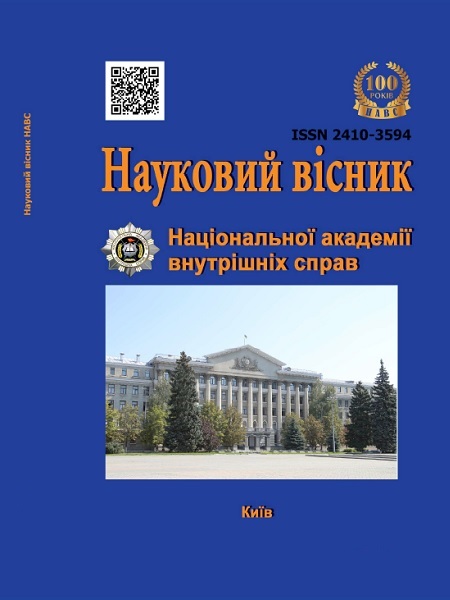The Typology of Public Control Over Elections in the Modern Constitutional and Legal Dimension
Abstract
The purpose of the article is to investigate the typology of public control over elections in modern constitutional and legal experience. To achieve it, the following tasks have been formulated: to analyze the available scientific approaches to the classification of public control over elections; substantiate their own typology of public control over elections in the current constitutional and legal experience. The methodology for preparing the publication is based on the use of a number of general scientific and legal methods. Among them is the method of formal logic, dialectical, comparative-legal, system-functional, grouping and others. The scientific novelty of the article is to investigate the typology of public control over elections in modern constitutional and legal experience. Conclusions. The typology of public control over elections in the present constitutional and legal experience is a complex and multi-level classification based on the differentiation of public control over elections on the basis of different criteria in order to define it more precisely in theoretical and legal terms. The main reason for this is the extremely dynamic and multidimensional nature of both the public control itself and the elections it holds. In the present constitutional and legal experience, it is proposed to classify public control over elections by the following criteria: 1) by the level of implementation; 2) by the level of constitutional regulation; 3) by the subjects; 4) by the time of conducting; 5) by type of election; 6) on the grounds of elections;
7) by constitutional and legal forms; 8) by volume; 9) by authentically; 10) by efficiency.
Keywords: elections; typology; public control; classification; constitutional law.
Downloads
References
Бекешкіна І., Довгич В. Опитування громадської думки. Фонд «Демократичні ініціативи». Київ, 2012. 49 с.
Declaration of Global Principles for non-partisan election observation and monitoring by citizen organizations and Code of Conduct for non-partisan citizen election observers and monitors (CDL-AD(2012)018-e). Venice Commission. URL: https://www.venice.coe.int/webforms/documents/?pdf=CDL-AD(2012)018-e.
Федоренко В. Л. Кагляк Я. О. Інститути громадянського суспільства та інститут громадських організацій в Україні. Бюлетень Міністерства юстиції України. 2009. № 4–5. С. 75–88.
Камінська Н. В. Організаційно-правові засади децентралізації публічної влади. Науковий вісник Національної академії внутрішніх справ. 2010. № 4. С. 9–20.
Каминская Н. В. Влияние глобализационных тенденций на становление региональных правовых систем. Международное право. 2014. № 2. С. 20–33. doi: 10.7256/2306-899.2014.2.10941.
Каминская Н. В. Перспективы становления европейской системы местного и регионального самоуправления. Право и политика. 2015. № 2 (182). С. 227–241. doi: 10.7256/1811-9018.2015.2.885.
Ключковський Ю. Б. Принципи виборчого права: доктринальне розуміння, стан та перспективи законодавчої реалізації в Україні : монографія. Київ : Ваіте, 2018. 908 с.
Козюбра М. Принцип верховенства права і реформа виборчої системи. Вибори та демократія. 2008. № 4.
С. 84–87.
Макушев П. В., Сибіряков С. О. Громадянська та правова культури як соціокультурний фактор у формуванні системи стримувань і противаг в умовах побудови громадянського суспільства. Право і суспільство. 2006. № 3. С. 31–37.
Мохончук Б. С., Чиріна В. Л. Питання реалізації активного виборчого права внутрішньо переміщеними особами в Україні. Форум Права. 2018. № 2. С. 81–89. doi: http://doi.org/10.5281/zenodo.1286091.
Нестерович В. Ф. Субсидійовані форми регулювання лобіювання: зарубіжний досвід та перспективи для України. Вісник Луганського державного університету внутрішніх справ імені Е. О. Дідоренка. 2011. № 4.
С. 15–24.
Нестерович В. Ф. Види впливу громадськості на прийняття нормативно-правових актів. Вісник Луганського державного університету внутрішніх справ імені Е. О. Дідоренка. 2014. № 1. С. 33–39.
Нестерович В. Ф. Практикум з Конституційного права України. Київ : Ліра-К, 2018. 640 с.
Нестерович В. Ф. Поняття та види джерел виборчого права України. Експерт: Парадигми юридичних наук і державного управління. 2019. № 2. С. 39–58. URL: http://maup.com.ua/assets/files/expert/4/3.pdf. doi: https://doi.org/10.32689/2617-9660-2019-4-2-39-58.
Нестерович В. Ф. Виборча кампанія: cловник сленгових термінів та виразів. Київ : Ліра-К, 2020. 648 с.
Опалько Ю. Вплив громадських організацій на виборчий процес. Вибори та демократія. 2006. № 4. С. 15–19.
Пономарьова Г. П., Матвейчук А. В., Матвейчук А. В. Виборчі системи для проведення місцевих виборів: досвід країн Вишеградської групи. Форум Права. 2018. № 2. С. 115–123. doi: http://doi.org/10.5281/zenodo.1288927.
Сердюк І. А. Методологічний аналіз інтерпретацій поняття «громадянське суспільство». Науковий вісник Дніпропетровського державного університету внутрішніх справ. 2014. № 2. С. 49–54.
Про Державний реєстр виборців : Закон України від 22 лют. 2007 р. № 698-V. Відомості Верховної Ради України. 2007. № 20. Ст. 282.
Про Центральну виборчу комісію : Закон України від 30 черв. 2004 р. № 1932-ІV. Відомості Верховної Ради України. 2004. № 36. Ст. 448.
Про звернення громадян : Закон України від 2 жовт. 1996 р. № 393/96-ВР. Відомості Верховної Ради України. 1996. № 47. Ст. 256.
Виборчий кодекс України : Закон України від 19 груд. 2019 р. № 396-IX. URL: https://zakon.rada.gov.ua/laws/main/396-IX.
Abstract views: 123 PDF Downloads: 257
- Authors reserve the right to authorship of their own work and transfer to the magazine the right of the first publication of this work under the terms of the Creative Commons Attribution License, which allows other persons to freely distribute published work with mandatory reference to authors of the original work and the first publication of an article in this magazine.
- Authors have the right to enter into separate additional agreements on non-exclusive dissemination of the work in the form in which it was published in the journal (for example, to post an article in the institution's repository or to publish as part of a monograph), provided that the link to the first publication of the work in this journal is maintained.
- The journal's policy allows and encourages the posting of articles by authors on the Internet (for example, in electronic storehouses of institutions or on personal websites), both before the submission of this manuscript to the editorial office and during its editorial processing, as this contributes to the creation of a productive scientific discussion and positively affects the efficiency and dynamics of citing the published work.




